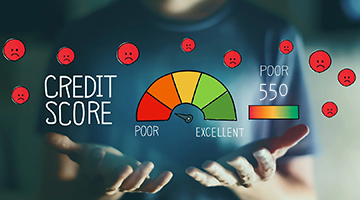550 Credit Score Loan: Can I Get One?

We’ve all been there, right? Life happens, and sometimes, our credit scores take a hit. Maybe it was that unexpected medical bill, the car repair that turned into a wallet-draining nightmare, or even a few too many late-night online shopping sprees. Whatever the reason, you’re not alone if you find yourself in the 550 credit score loan club.
You might wonder, “Can I still get a personal loan with a 550 credit score?” You’ve come to the right place! In this blog, 15M Finance is diving headfirst into the world of 550 credit score loans. We’ll explore what they are, where to find them, and, most importantly, how to increase your chances of getting one.
Table of Contents
- What is a Personal Loan?
- What’s the Minimum Credit Score Needed?
- Can You Get a Personal Loan with a 550 Credit Score?
- How to Get Personal Loans for a Credit Score Under 550?
- How Do Credit Scores Affect Loan Rates?
- How to Improve Your Credit Score?
- Monitor Your FICO Score
- Frequently Asked Questions
What is a Personal Loan?
A personal loan is similar to getting money from a bank, credit union, or an online loan lender for anything you want. Unlike an auto loan or a home loan, where the cash is attached to a particular reason, simple personal loans can be used for necessities like a vacation or home improvement. The loan specialist gives you a single amount of cash, and you consent to take care of it in fixed, regularly scheduled payments over a set period, generally up to 36 months.
What’s the Minimum Credit Score Needed?
Most lenders generally prefer a credit score of around 600 or higher. That’s not set in stone, though. Some more traditional banks might want a score closer to 700 to consider you for a personal loan. On the flip side, there are online lenders and credit unions that might be more forgiving and work with poor credit scores in the 580-600 range.
But hold on, don’t despair if your credit score is below these thresholds! You’ve still got options. You might have to shop around a bit more or be willing to pay a higher interest rate if your credit isn’t stellar.
Can You Get a Personal Loan with a 550 Credit Score?
The short answer is that it might be challenging but not impossible. A credit score of 550 is considered pretty low in the credit world. Lenders tend to prefer borrowers with higher scores because it indicates they’re more likely to repay their short-term loans on time. But wait to lose hope and apply through 15M Finance to find a bad credit personal loan within several minutes.
How to Get Personal Loans for a Credit Score Under 550?
So, you’ve got a credit score that could be better? Don’t sweat it – you’re not alone, and there are still ways to get a personal loan. Here’s the lowdown on how to do it:
Check Your Credit Reports: Get a copy of your credit reports. You can use one yearly free credit score monitoring from the three major credit bureaus (Equifax, Experian, and TransUnion). Look for any errors or discrepancies that might be dragging your score down. If you spot any, dispute them as soon as possible. Build Credit History: If your credit history is poor, consider opening a secured credit card. You’ll have to deposit as collateral, but it’s an excellent way to start building credit. Small Personal Loans: Look for lenders specializing in loans for people with bad credit. They might offer small personal loans that you can qualify for. Just be prepared to pay higher interest rates. Credit Unions: Some credit unions are more lenient regarding credit scores. Check with local credit communities to see if they have any options for personal loans based on your relationship with them rather than just your credit score. Cosigner: If you have a trusted friend or family member with a good credit score and want to borrow money, you could ask them to cosign your loan. They’ll be on the hook if you don’t make payments, so ensure you can handle the responsibility. Online Lenders: There are online lenders and peer-to-peer lending platforms that cater to borrowers with poor credit. They might have more flexible criteria.

How Do Credit Scores Affect Loan Rates?
Your FICO rating as a part of your credit report. Loan specialists use it to measure how risky it can be to lend you cash. The better your credit report, the better you are in their eyes, which generally implies lower financing costs on loans. Why? They see you as a capable borrower who will probably repay them on time.
If your FICO credit score isn’t excellent, personal loan lenders could get suspicious. They could believe you are not responsible for repaying the unsecured personal loan obligations or credit card debt. The lower credit scores, the higher financing costs. It’s their approach to safeguarding themselves if you’re not as dependable as they’d like you to be.
More or less, a good credit rating could help you get lower interest rates, setting aside your cash over the long term. However, your low credit score could mean you’ll need to hack up more money in revenue. In this way, it pays off to watch out for that FICO score and work on further developing it if you have any desire to catch the best interest charges.
How to Improve Your Credit Score?
A solid credit score can open all sorts of financial doors for you. Here are some informal tips to help you on your journey to credit score greatness:
Pay Your Bills on Time
A late monthly payment is like kryptonite for your credit score. Set up reminders, automate payments, and do whatever it takes to ensure you’re never late.
Reduce Credit Card Balances
Try to keep those credit card balances low. High balances relative to your credit limit can affect your score. Aim to use less than 30% of your available credit and the credit card company will see you as a trusted customer.
Don’t Close Old Credit Card Accounts
If you have old credit cards you’re not using, don’t rush to close them. The length of your credit history matters, so keeping those old accounts open can be a good thing.
Diversify Your Credit Mix
Having a mix of credit types can help your score. If you’ve only got credit cards, consider adding a personal loan or a payday loan.
Monitor Your FICO Score
Keeping an eye on your FICO score is like having a backstage pass to your financial life. In this wild world of credit and loans, your credit rating is your trusty sidekick. It can help you secure that dream car, that cozy home, and even those travel adventures you’ve been daydreaming about.
So, don’t ignore it! Make it a habit to monitor your credit score regularly. Whether climbing the ladder to a perfect 850 or trying to keep things in check, staying informed is your secret weapon.
Frequently Asked Questions
Is a 550 credit score bad?
Yes, a 550 credit score is considered bad. You might have trouble getting loans with bad credit or secured credit cards with reasonable repayment terms. It’s like a red flag to financial institutions.
Can you get a loan with a 550 credit score?
It’s challenging but not impossible. Lenders might not have a minimum credit score requirement and give you a loan with a 550 credit score. However, you should expect higher interest rates and limited options. Work on improving your credit if you can.
What can I get with a 550 credit score?
With a 550 credit score, you’ll likely have limited options and may face higher loan interest rates. You might qualify for basic credit cards or loans with poor credit score, but getting favorable terms will be more demanding. Work on improving your score to access better financial opportunities.
